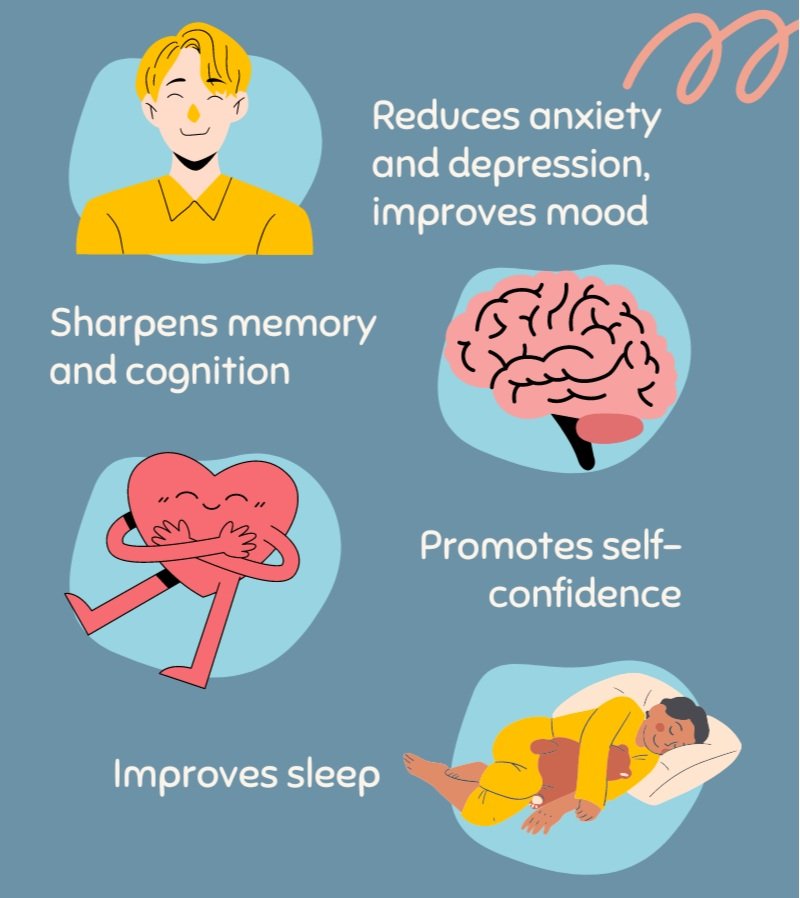Have you ever noticed how a simple workout can lift your mood and clear your mind? Exercise does more than just shape your body—it has a powerful impact on your mental health too.
If you’ve ever wondered why moving your body makes you feel better, you’re not alone. Understanding the science behind this can change how you approach your daily routine and help you take control of your emotional well-being. Keep reading to discover the surprising ways exercise can boost your brain, reduce stress, and keep your mind sharp.
Your mental health might just thank you for it.
Exercise And Brain Chemistry
Exercise has a strong effect on brain chemistry. It changes how chemicals work in the brain. These changes help improve mood and reduce stress. They also help the brain grow and stay healthy.
Understanding how exercise affects brain chemicals explains why it helps mental health. Let’s explore three key brain chemicals linked to exercise.
Endorphins And Mood Boost
Endorphins are natural chemicals in the brain. They act like painkillers and mood lifters. Exercise triggers the release of endorphins. This causes feelings of happiness and calm. It helps reduce feelings of pain and discomfort. Many people feel a “runner’s high” after exercise. This feeling comes from endorphins. Regular exercise keeps endorphin levels steady. This helps maintain a positive mood over time.
Neurotransmitters And Stress Relief
Neurotransmitters are chemicals that send signals in the brain. Exercise affects levels of serotonin and dopamine. These chemicals help control mood and stress. Higher serotonin helps reduce anxiety and depression. Dopamine improves focus and motivation. Exercise balances these chemicals to relieve stress. It helps the brain handle daily pressures better. This makes you feel calmer and less overwhelmed.
Brain-derived Neurotrophic Factor
Brain-Derived Neurotrophic Factor, or BDNF, helps brain cells grow. Exercise increases BDNF production in the brain. This supports learning, memory, and thinking skills. Higher BDNF levels protect the brain from damage. It also encourages new brain connections. This helps the brain stay flexible and healthy. Exercise acts like food for brain cells, helping them thrive.
Impact On Anxiety And Depression
Exercise plays a strong role in easing anxiety and depression. Moving the body helps calm the mind. It changes brain chemicals that affect mood. People who exercise often feel less worried and sad. The impact of exercise goes beyond just feeling good for a short time. It supports mental health in many lasting ways.
Reducing Symptoms With Regular Activity
Daily exercise lowers the signs of anxiety and depression. It releases endorphins, natural mood lifters in the brain. These chemicals help reduce stress and bring a sense of calm. Regular activity also reduces muscle tension and fatigue. This makes it easier to face daily challenges without feeling overwhelmed.
Exercise As A Complement To Therapy
Exercise works well alongside therapy or medication. It adds benefits that therapy alone may not provide. Physical activity helps improve sleep and focus. These changes support the work done in counseling sessions. Many doctors suggest exercise as part of a full treatment plan.
Long-term Mental Health Benefits
Exercise builds resilience against future mental health struggles. It strengthens the brain’s ability to handle stress and negative thoughts. Over time, people feel more confident and balanced. Keeping active also helps maintain healthy habits that protect mental health for life.
Cognitive Function Enhancements
Exercise does more than just strengthen the body. It also boosts brain power. Regular physical activity improves how the brain works. This helps with memory, focus, and thinking skills. The brain changes for the better with exercise. These changes support mental health and daily life.
Improved Memory And Focus
Exercise helps the brain store and recall information better. It increases blood flow to the brain, which fuels brain cells. This makes it easier to concentrate on tasks. People who exercise often can focus longer. Memory also improves, making learning new things easier.
Exercise And Neuroplasticity
Neuroplasticity means the brain can change and grow. Exercise supports this by creating new brain connections. These connections help the brain adapt to new information. Physical activity encourages brain cells to form new pathways. This keeps the brain flexible and able to learn.
Delay Of Cognitive Decline
Exercise slows down the loss of brain function as people age. It helps protect brain cells from damage. Regular activity lowers the risk of diseases like dementia. Staying active keeps the mind sharp for longer. This means better quality of life in older age.

Credit: www.mygoodbrain.org
Stress Reduction Mechanisms
Exercise helps the mind by reducing stress. It changes how the body reacts to pressure. The body feels calmer and less tense after physical activity. Stress reduction is one big reason exercise improves mental health.
Lowering Cortisol Levels
Cortisol is the main hormone linked to stress. High cortisol makes people feel anxious or tired. Exercise lowers cortisol levels in the body. This drop helps the brain feel peaceful. Regular workouts keep cortisol balanced and reduce stress.
Physical Activity And Relaxation
Moving the body releases chemicals that relax the mind. These chemicals include endorphins, which boost mood. Exercise also eases muscle tension. A relaxed body sends signals to the brain to calm down. This process helps clear stress from the mind.
Sleep Quality Improvements
Stress often causes poor sleep, which hurts mental health. Exercise improves how well and how long people sleep. Better sleep helps the brain recover from stress. Regular physical activity leads to deeper, more restful sleep. Good sleep lowers stress and improves mood.
Social And Emotional Benefits
Exercise offers more than physical health benefits. It also improves social and emotional well-being. Being active helps people connect with others and feel better about themselves. This connection and emotional boost play a big role in improving mental health.
Group Exercises And Social Interaction
Group exercises create chances to meet new people. Talking and working out with others reduce feelings of loneliness. Sharing goals and achievements builds a sense of community. This social support helps lower stress and anxiety levels.
Boosting Self-esteem
Exercise helps people feel proud of their progress. Reaching small fitness goals increases confidence. Feeling stronger and healthier improves self-image. Better self-esteem reduces negative thoughts and promotes positive feelings.
Building Resilience
Regular exercise teaches how to face challenges. Overcoming physical limits builds mental strength. This strength helps handle stress and setbacks better. Resilience from exercise supports overall emotional health.

Credit: www.limberhealth.com
Types Of Exercise For Mental Health
Exercise boosts mental health in many ways. Different types of exercise help the brain and body in unique ways. Choosing the right kind can improve mood, reduce stress, and increase focus. Here are three main types of exercise that support mental well-being.
Aerobic Activities
Aerobic exercises include walking, running, cycling, and swimming. These activities raise your heart rate and improve blood flow to the brain. Aerobic workouts release chemicals that make you feel happy and calm. They help reduce anxiety and depression symptoms. Doing aerobic exercise regularly can improve sleep quality too.
Strength Training
Strength training means lifting weights or using resistance bands. This type builds muscle and increases body strength. It also helps reduce feelings of fatigue and boosts self-confidence. Strength workouts can improve brain function and memory. Regular sessions may lower stress and improve overall mood.
Mind-body Practices
Mind-body exercises include yoga, tai chi, and Pilates. These focus on breathing, balance, and gentle movement. They calm the mind and reduce stress levels. Mind-body practices improve concentration and emotional control. They also help ease symptoms of anxiety and depression.
Creating A Sustainable Routine
Creating a sustainable exercise routine is key to improving mental health. Regular physical activity helps reduce stress and boost mood. The challenge lies in making exercise a lasting habit. This section shows how to build a routine that lasts and supports mental well-being.
Setting Realistic Goals
Start with small, clear goals. Choose activities that feel enjoyable. Avoid setting too many goals at once. This helps keep motivation high. Achieving small goals builds confidence. It makes exercise feel less like a chore. Realistic goals fit your daily life and energy.
Overcoming Barriers
Common barriers include time, energy, and motivation. Find simple ways to deal with these. Try short workouts if time is tight. Rest when you feel tired. Plan exercise at a time that suits you. Ask a friend to join for support. Removing barriers helps keep the routine steady.
Tracking Progress
Keep a log of your workouts and feelings. Note improvements in mood and energy. Seeing progress motivates you to continue. Use a notebook or an app to track. Celebrate small wins to stay positive. Tracking shows how exercise benefits your mental health.

Credit: www.fitnessforhealth.org
Frequently Asked Questions
How Does Exercise Reduce Stress And Anxiety?
Exercise triggers the release of endorphins, natural mood boosters. It lowers stress hormones like cortisol, promoting relaxation and calmness. Regular physical activity improves sleep and increases self-confidence, which together reduce anxiety levels effectively.
Can Exercise Improve Symptoms Of Depression?
Yes, exercise stimulates brain chemicals like serotonin and dopamine that elevate mood. It enhances overall brain function and encourages positive thinking. Consistent workouts can be as effective as some antidepressants in reducing depression symptoms.
What Types Of Exercise Benefit Mental Health Most?
Aerobic exercises like walking, running, and cycling are best for mental health. They increase heart rate and oxygen flow to the brain, improving mood. Strength training and yoga also help by reducing stress and enhancing mental clarity.
How Often Should I Exercise For Mental Health Benefits?
Aim for at least 30 minutes of moderate exercise five times a week. Consistency is key to maintaining improved mood and reduced anxiety. Even short daily sessions can provide noticeable mental health improvements over time.
Conclusion
Exercise helps the brain release chemicals that lift mood and reduce stress. It boosts energy and sharpens focus throughout the day. Moving the body also improves sleep, which supports mental health. Small steps, like walking or stretching, can make a big difference.
Consistency matters more than intensity or duration. Feeling better starts with simple, regular activity. Mental health and exercise work hand in hand. Try to add some movement to your routine today. Your mind will thank you for it.
